|
|
|
Sort Order |
|
|
|
Items / Page
|
|
|
|
|
|
|
| Srl | Item |
| 1 |
ID:
060324
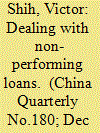

|
|
|
| 2 |
ID:
081895


|
|
|
|
|
| Publication |
2008.
|
| Summary/Abstract |
Using simple statistical analysis of county-level budgetary data from across all of China's counties, the present paper examines whether the post-1994 fiscal decentralization has affected redistribution at the county-level. The new fiscal system has been less able to narrow inter-county dispersion in fiscal imbalances than the old one, even after taking intergovernmental transfer payments into account. Although with the post-1994 system there has been a modest increase in per capita welfare spending in all counties on average, much of the new-found fiscal resources have been spent on salary and administrative expenses rather than spending on public goods. Therefore, it is imperative that the reform of China's tax system is intensified
|
|
|
|
|
|
|
|
|
|
|
|
|
|
|
|
| 3 |
ID:
050318
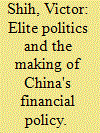

|
|
|
|
|
| Publication |
Feb 2004.
|
| Summary/Abstract |
This article begins by focusing on the distributive implications of factions, as conceptualized by past theorists. This article then operationalizes faction as a quantitative variable using some well-established assumptions about factions. A cross-section, time-series model is then used to test the impact of factions and the intensity of factional ties on the distribution of bank loans in reform era China. Two pairs of case studies are further used to illustrate the importance of factional ties in the allocation of scarce resources in the Chinese political system. The findings are unambiguous: factional ties with top leaders can bring substantial advantage in obtaining scarce resources in the system.
|
|
|
|
|
|
|
|
|
|
|
|
|
|
|
|
| 4 |
ID:
095311
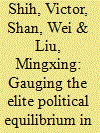

|
|
|
|
|
| Publication |
2010.
|
| Summary/Abstract |
Can one man dominate the Chinese Communist Party? This has been a much debated issue in the field of Chinese politics. Using a novel database that tracks the biographies of all Central Committee (CC) members from 1921 to 2007, we derive a measure of top CCP leaders' factional strength in the CC. We show that Mao could not maintain a commanding presence in the Party elite after the Eighth Party Congress in 1956, although the Party chairman enjoyed a prolonged period of consolidated support in the CC at a time when the CCP faced grave external threats. No Chinese leader, not even Mao himself, could regain the level of influence that he had enjoyed in the late 1940s. Our results, however, do not suggest that a "code of civility" has developed among Chinese leaders. The Cultural Revolution saw the destruction of Liu Shaoqi's faction. Although violent purges ended after the Cultural Revolution, Chinese leaders continued to promote followers into the CC and to remove rivals' followers
|
|
|
|
|
|
|
|
|
|
|
|
|
|
|
|
| 5 |
ID:
113547


|
|
|
|
|
| Publication |
2012.
|
| Summary/Abstract |
Spectacular economic growth in China suggests the ruling Chinese Communist Party (CCP) has somehow gotten it right. A key hypothesis in both economics and political science is that the CCP's cadre evaluation system, combined with China's geography-based governing logic, has motivated local administrators to compete with one another to generate high growth. We raise a number of theoretical and empirical challenges to this claim. Using a new biographical database of Central Committee members, a previously overlooked feature of CCP reporting, and a novel Bayesian method that can estimate individual-level correlates of partially observed ranks, we find no evidence that strong growth performance was rewarded with higher party ranks at any of the postreform party congresses. Instead, factional ties with various top leaders, educational qualifications, and provincial revenue collection played substantial roles in elite ranking, suggesting that promotion systems served the immediate needs of the regime and its leaders, rather than encompassing goals such as economic growth.
|
|
|
|
|
|
|
|
|
|
|
|
|
|
|
|
| 6 |
ID:
108356
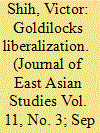

|
|
|
|
|
| Publication |
2011.
|
| Summary/Abstract |
Nearly two decades after central bankers began to call for interest rate liberalization, the central bank continues to impose stringent rules on the fluctuation of deposit interest rates. This seems an unlikely outcome given widespread endorsement of liberalization by technocrats and experts both in and out of the government, China's accession to the World Trade Organization, and the technocrats' insulation from popular pressure. To be sure, local interests and central bank lobbying have driven gradual liberalization of interest rates. However, senior Chinese technocrats held on to control over interest rates because of their need to maintain state banks' dominance and to mobilize bank funds in times of economic downturns. As such, progress toward interest rate liberalization only to ok place during "Goldilocks" phases when the economy enjoyed healthy growth without high inflation.
|
|
|
|
|
|
|
|
|
|
|
|
|
|
|
|
| 7 |
ID:
124767
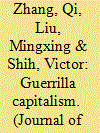

|
|
|
|
|
| Publication |
2013.
|
| Summary/Abstract |
In this article, we propose a causal relationship between a region's communist revolutionary legacy before 1949 and the variation in private sector development after 1949. In the case of Zhejiang, the pre-1949 revolutionary experience led to the power struggle between two elite groups, the guerrilla cadre group and the southbound cadre group, in the province after 1949. As the weak side, guerrilla cadres were willing to protect local economic interests in exchange for local popular support, which improved their odds of political survival. As a result, in contrast with counties where the guerrilla forces were historically weak, counties with strong guerrilla forces before 1949 saw significantly more robust private sector development throughout much of the Mao and post-Mao periods. In this article we provide preliminary historical and statistical evidence to support this hypothesis.
|
|
|
|
|
|
|
|
|
|
|
|
|
|
|
|
| 8 |
ID:
089545
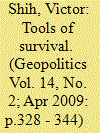

|
|
|
|
|
| Publication |
2009.
|
| Summary/Abstract |
The rise of sovereign wealth funds (SWFs) as major investors in the global economy has raised worries that they serve the geopolitical ends of owner countries. However, given the paramount importance of surviving domestic political competitions, SWFs are likely also tools of domestic political survival. In examining the corporate governance and underlying political environment in which SWFs in Singapore and in China operate, this paper further examines the role of political unity in directing SWF behaviour in authoritarian regimes. The main finding is that a highly unified autocracy is more likely to direct SWFs to maximise long-term profit, while a fragmented one like China is more likely to treat its SWF as an arena for domestic political and bureaucratic infighting. SWFs operating in a fragmented regime are unlikely to make long-term profit and foreign policy objectives top priorities, and their behaviour can be highly unpredictable.
|
|
|
|
|
|
|
|
|
|
|
|
|
|
|
|
|
|
|
|
|